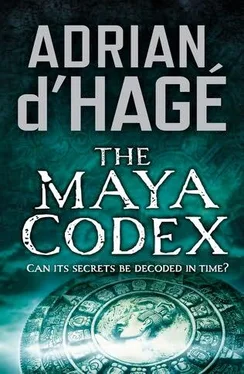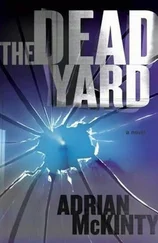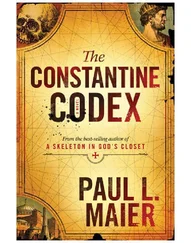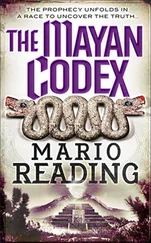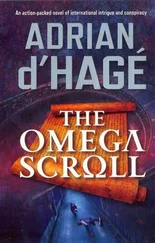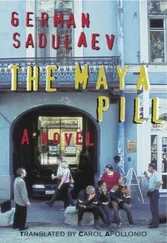Adrian D'Hage - The Maya codex
Здесь есть возможность читать онлайн «Adrian D'Hage - The Maya codex» весь текст электронной книги совершенно бесплатно (целиком полную версию без сокращений). В некоторых случаях можно слушать аудио, скачать через торрент в формате fb2 и присутствует краткое содержание. Жанр: Политический детектив, на английском языке. Описание произведения, (предисловие) а так же отзывы посетителей доступны на портале библиотеки ЛибКат.
- Название:The Maya codex
- Автор:
- Жанр:
- Год:неизвестен
- ISBN:нет данных
- Рейтинг книги:3 / 5. Голосов: 1
-
Избранное:Добавить в избранное
- Отзывы:
-
Ваша оценка:
- 60
- 1
- 2
- 3
- 4
- 5
The Maya codex: краткое содержание, описание и аннотация
Предлагаем к чтению аннотацию, описание, краткое содержание или предисловие (зависит от того, что написал сам автор книги «The Maya codex»). Если вы не нашли необходимую информацию о книге — напишите в комментариях, мы постараемся отыскать её.
The Maya codex — читать онлайн бесплатно полную книгу (весь текст) целиком
Ниже представлен текст книги, разбитый по страницам. Система сохранения места последней прочитанной страницы, позволяет с удобством читать онлайн бесплатно книгу «The Maya codex», без необходимости каждый раз заново искать на чём Вы остановились. Поставьте закладку, и сможете в любой момент перейти на страницу, на которой закончили чтение.
Интервал:
Закладка:
‘ Juden verrecke! Death to the Jews!’ one of them yelled, hurling brick after brick through the window. The mob, armed with iron bars, stormed in and began systematically smashing glass shelving, counters, cases, anything that would break. They splashed yellow paint over the designer dresses and hats. One thug climbed the stairs and began to batter the door with the butt of his rifle, but the rest of the mob was moving on, and he gave up. ‘We’ll be back, Jew bastards!’ he yelled as he ran down the stairs to catch up.
‘How long do you think we’ve got?’ Ramona asked, her arms around Rebekkah and Ariel. Rebekkah sobbed and Ariel fought back the tears, both of them terrified. The sounds of smashing glass receded, replaced by sirens as flames began to pour from the Synagogue, just a block away from Judengasse.
‘We’ll have to pack tonight,’ Levi replied, his eyes moist.
13
ISTANBUL
T he sun bade farewell in a fiery salute, streaking the sky to the west of Istanbul with fierce red and orange. In stark contrast to Cardinal Pacelli, who when papal nuncio in Munich had travelled in a black limousine adorned with the Vatican coat of arms, the papal delegate to Turkey and Greece and future Pope John XXIII, Archbishop Angelo Roncalli, elected to leave his old battered Fiat in the garage. Dressed in comfortable civilian attire, Roncalli hailed a ramshackle taxi in the narrow road outside the Papal Embassy in Olcek Sokak. In years to come, long after he had died, a grateful Turkish people would rename Olcek Sokak ‘Pope Roncalli Street’.
‘Hotel Pera Palas, please.’
‘ Evet, Pera Palas!’ The old driver engaged the gears with a frightening crunch and pulled out into the chaos that was Istanbul’s traffic, waving his hand placatingly at those yelling abuse that was nothing more than ritual amidst the cacophony of screeching brakes and blaring horns.
‘Senin bir ailen var? You have a family?’ Roncalli asked the wizened driver.
‘Evet.’ The taxi driver’s dark face creased with a smile at Roncalli’s use of his native tongue, his smile punctuated by three missing teeth. ‘Two boys and a girl,’ he answered proudly. ‘And you?’
Roncalli smiled and shook his head. ‘Hayir. Just me.’
The roadside was thick with traders, and the driver threaded his way past them with a practised ease. Tarpaulins were spread edge to edge with eclectic offerings of fish and chickens, leather and brass, shoes and shirts, and occasionally uds and cumbus, Turkish lutes and mandolins. They reached Refik Saydam Caddesi and began the descent towards the Bosphorus, the long narrow stretch of water that connects the Black Sea to the Marmara. On the other side of the road, an old brown horse, ribs showing through his pitifully thin coat, nostrils flared and breath clouding in the cold, laboured to pull an impossible load up the steeply sloping hill. The rubber tyres on the rickety wooden cart had worn through to the canvas, and the hessian sacks of rice, spice and coffee, piled three metres high, defied gravity. Old men struggled past under the weight of big wicker baskets full of oranges, bananas and bread. Legless beggars sitting on small wheeled boards pushed their way between smaller carts, some supporting brass urns full of strong Turkish coffee, others containing braziers on which chestnuts and kebabs were roasting. Myriad smells of spices and meats wafted through the open window of the taxi.
‘Thank you, my friend,’ Roncalli said as they reached the Hotel Pera Palas. ‘A little extra for the children,’ he added, pressing more lire into the taxi driver’s hand.
Roncalli paused and took in the view of the Golden Horn. Across the harbour, the minarets of the great mosques of Istanbul rose like stone fingers towards the evening sky. Roncalli turned and headed towards the Pera Palas, an opulent rococo-style building on Mesrutiyet Caddes i. A young bellboy with dark curly hair, dressed in black trousers and a deep-purple military jacket topped with gold epaulettes, smiled broadly and sprang to open the brass-plated double doors.
Behind the dark polished wooden counter of reception, pigeon holes held the heavy brass room-keys. On one side of the desk stood a telephone with a black bell-shaped mouthpiece and a heavy Bakelite earpiece. To the right of reception, a wide, sweeping marble staircase carpeted in red wound its way around the steel pillars and wire mesh enclosing the lift well, where another young bellboy stood ready to open the heavy wooden doors.
Archbishop Roncalli made his way into the big chandeliered vestibule, the magnificent handmade Persian carpet soft beneath his shoes. At intervals down the centre of the room, tall pots were filled with flowers. Heavy carved wooden sideboards, gilt-framed mirrors and elegant Egyptian-styled vases lined the walls, but the Pera Palas was not all it seemed. Istanbul was on the Silk Road straddling Europe and Asia, and the city was ideally positioned midway between Eastern Europe and Palestine. As the world teetered on the precipice of war, the Turkish government was determined to remain neutral. But they had allowed the Jewish Agency, an organisation set up after the Great War to support the international Jewish community, to open an office in the hotel.
Mordecai Herschel was already waiting for Roncalli at one of the antique tables in the vestibule.
‘Angelo, thank you for coming.’ Herschel rose from his chair and extended his hand. Now in his fifties, but still lean and fit, he had been a major in the Haganah, the military wing of David Ben-Gurion’s Jewish Agency in Palestine, where he’d been wounded in a clash with the British. His face still bore the scar on his right cheek. Herschel had been selected to set up an agency in Istanbul as part of the Zionists’ desperate attempts to save their countrymen from the Nazis. In physical contrast to Herschel, Roncalli was a big bear of a man, not naturally inclined to exercise. He had thinning hair and a long oval face that was dominated by a large roman nose. They made an interesting pair, the fit-looking former freedom fighter and the rotund archbishop. Both were deep thinkers, bonded by a common devotion to justice and humanity.
‘Any news from the Vatican?’ Herschel asked.
‘They’re sending a papal envoy, although that could be a delaying tactic. I’m afraid Rome can be somewhat removed from the problems of the real world.’ Cardinal Pacelli’s silence in response to Roncalli’s pleas for help for the Jews had been deafening.
Herschel nodded. ‘I understand. Closer to home, one of our biggest problems is communications, Angelo. Finding native speakers with all the qualities we need has not been easy, but I’ve now got an agent in Romania and one in Hungary, and another two will leave next week for Yugoslavia and Bulgaria. I’ve also managed to infiltrate the Austrian concentration camp at Mauthausen.’
‘If you need secure transmission of messages, I have some people I can trust in our embassies and we can use the black bag.’
‘Won’t the Vatican object?’
‘Only if they find out.’ Roncalli smiled broadly, immensely pleased with himself. ‘God won’t object, and he holds a lot of the votes.’
‘Thank you, Angelo. I’m very grateful. The Turkish Post Office has been helpful, and we’ll continue to use them for contact with ordinary citizens, but it’s good to know there’s a more secure line.’
Roncalli leaned closer. ‘And,’ he said quietly, ‘I was thinking, too, of the children. If we were to produce Certificates of Conversion to Catholicism with the appropriate stamps of approval, would that help?’ It was not the first time the elegant Pera Palas hotel had been host to a conspiratorial plot. The Mata Hari had drunk in the Orient Express Bar, as had Alfred Hitchcock and Ernest Hemingway; and after Agatha Christie’s crashed car had been found abandoned, amidst false rumours she had drowned, Christie wrote Murder on the Orient Express in room 411.
Читать дальшеИнтервал:
Закладка:
Похожие книги на «The Maya codex»
Представляем Вашему вниманию похожие книги на «The Maya codex» списком для выбора. Мы отобрали схожую по названию и смыслу литературу в надежде предоставить читателям больше вариантов отыскать новые, интересные, ещё непрочитанные произведения.
Обсуждение, отзывы о книге «The Maya codex» и просто собственные мнения читателей. Оставьте ваши комментарии, напишите, что Вы думаете о произведении, его смысле или главных героях. Укажите что конкретно понравилось, а что нет, и почему Вы так считаете.
